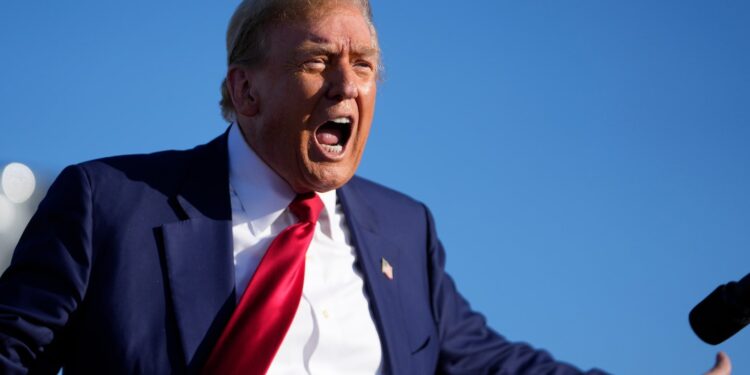“It makes no sense,” Johnson continued. “And everyone wants to know around the country, why would they do that? Because they want to turn these people into voters. That’s the only thing, the only rational explanation for what they have done.”
This is rhetoric that comes just short of the “great replacement theory,” an argument that seeped from the racist fringes of conversation into the mainstream. The unfounded theory holds that there’s a secret plot to reshape American society by intentionally encouraging immigrants to enter the country.
Johnson’s argument mirrors his embrace of legislation aimed at curtailing already illegal, rare occurrences of voting by noncitizens, an issue that allows his party to talk both about immigration and election security — two of Donald Trump’s favorite issues. But it also means that the speaker is endorsing a historically aberrant view of immigration, one that is at a remarkable distance from the once-common idea that immigration is beneficial and a mark of U.S. exceptionalism.
But, then, this sort of hostility to social and cultural change is a hallmark of his party at the moment — particularly the large majority of his party that, like Johnson, is aligned with Trump.
On Thursday, the Pew Research Center released an extensive report looking at Americans’ views on race, gender and cultural issues. It included questions that help delineate the unique ways in which Trump supporters view those issues and the extent to which insecurity about the status of White men, in particular, is elemental to the movement.
Take a question about whether the diversity of America’s population strengthens the country. Overall, Americans were more likely to say that diversity strengthened society than they were to say that it weakened society by a 54-point margin. Among Biden supporters, the gap was 78 points. Among Trump supporters? Only 30. Less than half of Trump supporters said that America’s diversity strengthened society.
That was just one question. The research included several similar queries, ones aimed at elucidating how comfortable Americans are with different aspects of that diversity.
We isolated six of them, two related to each of three subjects: race, immigration and gender. The results are below, broken out by the total population, by Biden supporters and by Trump supporters. (The “overall” label applies to all members of those groups, so all Biden supporters, for example.) Some thoughts follow the chart.
Race: First, notice the divide between younger and older responses on the questions of race. Younger Americans, as we’ve noted in the past, are more likely to be non-White, which probably plays a role here. Notice, too, that the views of Black respondents are stronger than those of the overall group, even within the subset representing Biden supporters. (There were not enough Black Trump supporters to break out their responses.)
Also notice the staggering low numbers among White Trump supporters, almost none of whom consider slavery to have ongoing effects and almost none of whom believe that Whites have systemic advantages in society. Instead, many Trump supporters and White Republicans in general view Whites as targets of unfairness and discrimination — a sentiment that has long been a driving element of Trump support.
Immigration: The divide between younger and older respondents is seen here, too, but more dramatically so among Trump supporters on the question of openness to immigration. Younger Americans are also more likely to have family members who are immigrants or to be immigrants themselves.
Gender: Just as Trump supporters are less likely to believe that there are systemic obstacles for Black Americans, they are also more likely to believe that systemic obstacles for women have been overcome. For these questions, Pew broke out responses by gender and age, showing that Trump-supporting men, particularly those under the age of 50, believe that systemic sexism is a thing of the past.
They are also more likely to see gains made by women in American society in zero-sum terms, with 4 in 10 Trump-supporting men under the age of 50 thinking that those gains have come at the expense of men. Biden-supporting men under 50 are also more likely than Biden-supporting women to hold that view, but at less than half the rate of Trump supporters in that group.
Perhaps Pew’s most pointed question on this subject centered on the increase in racial diversity in the United States over time, largely a function of the increase in immigration since the end of the baby boom. Most Americans, including most supporters of Biden and Trump, see the decline in the percentage of Whites in the population as neither good nor bad. But Trump supporters are 35 points more likely to say “bad” than “good,” compared with a 14-point gap overall.
Nearly 1 in 5 Trump supporters views the increased diversity in the United States as very bad for society.
There is research that shows that White Republicans are more triggered by reports of the decline in the density of the White population in America and that the idea of hard lines of racial identity is overly simplistic. Pew’s research makes obvious how the former concern manifests on the right.
So does Johnson’s rhetoric, of course. He knows that he will harvest more political utility from claiming that Democrats are engaged in a plot to subvert White political dominance — which, of course, was the subtext to his comments — so that’s what he presents.
He is giving Trump’s base what it wants.






